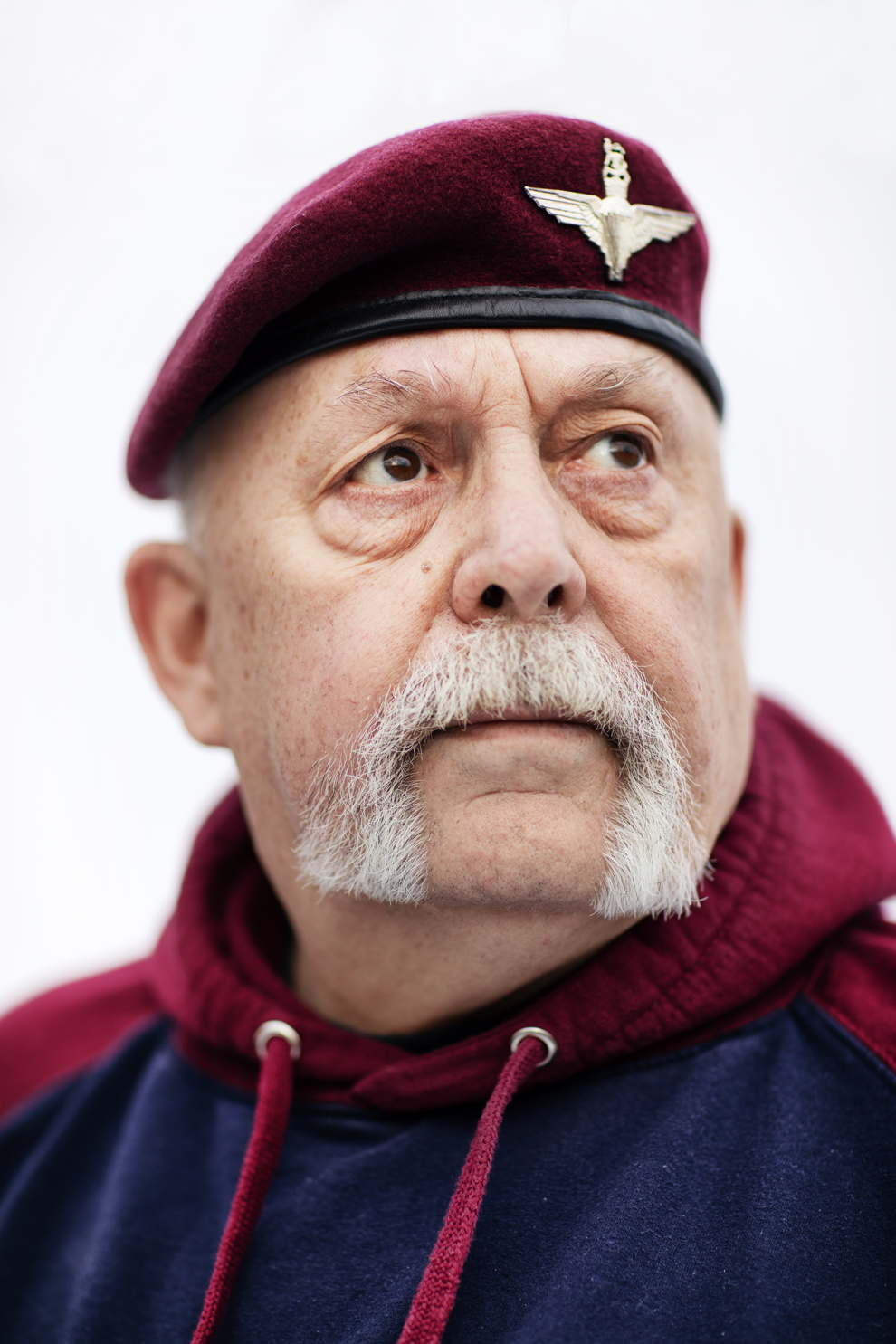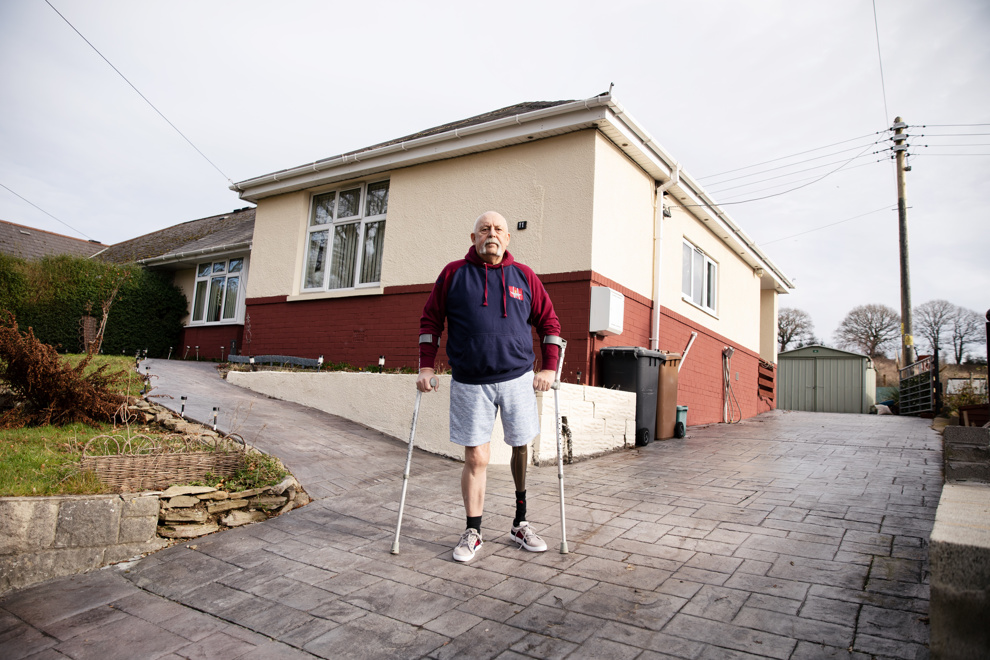Remembering the Falklands War: Denzil Connick's Story
Former Paratrooper Denzil was a 25-year-old Lance Corporal in an anti-tank platoon during the Falklands War. He lost his left leg at the hip and severely damaged his right leg when he was hit by a mortar round on 13 June 1982. This is his story.
Denzil grew up in Chepstow the eldest of four brothers. He joined the Army as a Junior Leader at the age of 15 and then served for 12 years with 3 Parachute Regiment. He was a 25- year-old Lance Corporal in an anti-tank platoon in the Falklands War where he lost his left leg at the hip.
At the age of 65, he is now Life Vice President and founding secretary of the South Atlantic Medal Association, a charity that campaigns for Falklands veterans and helps them and their families return to the islands on pilgrimage.
Were you always destined to be a soldier?
I was initially interested in joining the RAF, but they wanted me to stay at school so I joined the closest Army unit that would keep me near aircraft: The Parachute Regiment. My mum was horrified; none of my three brothers showed any inclination to join up.
Mum and dad worked hard all their lives and instilled that same ethic in us – that’s what made me accept the Army way. You get what you work for! I was lucky to travel to places like Sudan, Malaysia, Canada and across Europe, and I had lots of adventures.
Was the Falklands War expected?
3 Para was the spearhead battalion at the time – the Infantry regiment earmarked to go first to any flare-up around the world. I remember we were called for a briefing and thought it would be Northern Ireland or some Cold War stuff. We had no idea where the Falklands were!
In just a matter of days we were ready to get on the luxury liner SS Canberra. It was a beautiful ship, and it was a bit surreal. It had a swimming pool and bars for drinks after dinner. It didn’t feel like we were going to war!
What was the mood like on board?
There were about 1,800 troops from the Paras and the Commandos plus the Royal Navy and merchant crews. We trained and kept fit during the day, and checked and re-checked our equipment. The mood was determined yet relaxed until we got to Ascension Island where we could train on land. We were there a week or so then the Task Force sailed on and it was obvious diplomatic moves were failing.
The mood changed distinctively with the sinking of ARA General Belgrano. A lot of people thought this was all just sabre-rattling and that we’d turn back for home before even getting there. But there was no going back after that – we were fully committed.
What was the military approach when you got to the Falklands?
By then, HMS Sheffield had been lost and there was a sombre realisation that this was the real deal. The nature of war is that people die and it was what we signed up for.
On 21 May we went ashore at Port San Carlos and established positions overlooking the bay. We had a grandstand view of the Argentine Air Force playing havoc with our ships as we tried to get personnel and stores ashore. Just about every ship was attacked in that first week; it was horrendous.

What happened next?
We were about 70 miles from Stanley, with some inhospitable terrain between us and with worsening winter weather for company. It was the hardest physical challenge I’d endured in my life.
Mount Longdon, our objective, was a daunting natural fortress. The enemy was dug in well with machine guns, mortars and 106mm recoil-less anti-tank rifles. We got ready for a silent assault to take them by surprise and advanced into contact with rifle, bayonet and grenade.
I was one of the oldest at 25 – we had lads who were 17 and 18. I was a Lance Corporal so the younger ones were looking up to me. I was no less scared than they were but I had to crack on. A point in our favour was our training in the Brecon Beacons so we were used to that type of ground and conditions, and we’d been out in the open in atrocious conditions for a few weeks already
How did the battle unfold?
One of our guys stood on a mine which gave the Argentinians vital moments to get out of their sleeping bags and man their positions. Then all hell broke loose. It was dark and it was bedlam; there were explosions, flashes, screaming... You had friends going down and enemy being killed – it was a weird, frightening, out-of-this world experience.
We advanced behind B Company 3 Para, providing them with supporting fire from GPMG machine guns and Milan missiles (bunker busters) firing just 50 metres ahead. It was all very closeup stuff. In a matter of hours, we had lost 23 comrades and more than 50 had been injured, many seriously. None of us had seen anything like it, but we had to keep going as the battle rolled on for a good 12 hours from the night of 11 June into the next day.
What happened on 13 June?
Although Mount Longdon had been taken, we were being constantly shelled from Stanley as they knew exactly where we were. I was going along a sheep track when I was hit by a 120mm mortar. It took my left leg clean off and shredded my right leg. The other soldier I was with died of his wounds.
I had life-saving attention at the scene and was taken to a field hospital at Fitzroy Cove, where I suffered a heart attack because I had lost so much blood. But the surgeons saved me and transferred me to the hospital ship SS Uganda, where I stayed for four weeks before I was repatriated to the UK.
What were conditions like on SS Uganda?
I was in a morphine haze for the first part and was there with guys who had sustained some terrible injuries, but the spirit was second to none and the medical staff and crew were amazing. There was a great deal of British Forces humour and that helped many of us get through those days. Regardless of age, background or rank we just bounced off each other, and that ‘brothers-in-arms’ attitude definitely helped our recovery.
You have another very important anniversary on 11 June…
Yes, exactly one year after the Battle of Mount Longdon, I walked down the aisle of St. Mary’s Church in Chepstow using just a wooden walking cane to get married to Theresa. I was determined to celebrate something good on that day, but you never forget what happened and the friends you lost.
We have two sons; Matthew is a Royal Navy submariner and Stephen is a Royal Welsh Fusilier who has served in Iraq and Afghanistan. I have a wonderful family; a brilliant wife, children and grandchildren – what more could you ask for?

What was your first contact with Blesma?
The Association was in touch almost straight away after I was injured. I spent months in the Queen Elizabeth Military Hospital in Woolwich when I came home, and I remember someone coming to see me and the other amputees there. I wasn’t mentally geared up to ask for help back then, but it was good to know Blesma was there.
It takes a while to sort out how you react to these things and everyone is different. You’ve experienced life-changing injuries that bring huge implications to your future, and it takes some time to move on. Blesma is very good at understanding that and being there when needed.
How has Blesma helped you?
Over time, the Association has helped with decorating and gardening grants which have been much appreciated, and Blesma helped with a big project to sort out my driveway which was basically a farm track that made access to my house difficult. It meant so much to get that done. But a really important hallmark of Blesma is knowing that support and camaraderie are always there. The help goes way beyond simply offering financial support.
What does Blesma contribute to the amputee and veteran community?
It is a shining example of encouraging amputees of all ages to get involved with activities, whether they are adventures or something more modest. Camaraderie and friendship are vital aspects of recovery. Blesma offers a life-long relationship. For myself and many others, it has been a lifesaver and a brilliant support.
Donate now to support Veterans like Denzil
We can help
We are dedicated to assisting serving and ex-Service men and women who have suffered life-changing limb loss or the use of a limb, an eye or sight. We support these men and women in their communities throughout the UK. Click the link below to find out the different kinds of support we offer.
Get Support
Leave a comment
Join fellow Members and supporters to exchange information, advice and tips. Before commenting please read our terms of use for commenting on articles.